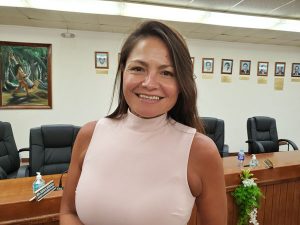King-Hinds: I’m happy we can now move on from this issue
The Commonwealth Ports Authority is thankful that the issue whether CPA should or should not be exempted from paying the 1% Office of the Public Auditor fee on its airport revenues is now over with the enactment of a new law that makes the exemption possible.
Last week, Senate President Jude U. Hofschneider (R-Tinian), who was then the acting governor, signed into law House Bill 22-102, in the form of HS1, HD1, that exempts the CPA from paying OPA’s 1% fee that would come from CPA’s airport revenues.
In a brief response to the bill’s passing, CPA board chair Kimberlyn King-Hinds said she is just happy that OPA and CPA can move on from the issue.
“CPA is thankful to Speaker Edmund Villagomez and Senate President Jude Hofschneider for their leadership throughout this process. This is a task I can now mark as completed. There’s a lot of work to be done and I’m happy that we can move on from this issue,” she said.
The exemption under Public Law 22-18 only applies to CPA and its airport revenues. Thus far, the Northern Marianas Housing Corp., the Public School System, the Legislature, and now CPA are exempted by statute from paying the OPA fee.
In a previous interview with King-Hinds, she said that conversations surrounding the 1% OPA fee has been an ongoing issue with the Legislature dating back years.
King-Hinds noted that CPA depends on the revenue it generates to fund operations, personnel, maintenance and improvements at the ports and any additional costs, including the 1% OPA fee, is passed on to either CPA tenants or the traveling public.
CPA does not object to being charged the 1% OPA fee for non-airport revenues. It was another matter, though, with CPA’s airport revenues, as it could possibly violate CPA’s grant requirements with the Federal Aviation Administration.
“As far as CPAs concerned, we’re agnostic as to whether or not we have to pay or not pay the 1%. What we’re trying to do basically is comply with our grant assurance requirements, and what the FAA is saying is [in regards to this 1% fee] is that if we’re not spending money directly toward operations of the airport, and using whatever revenues that we’re collecting, it’s called revenue diversion. That’s not our rule. It’s a rule that we have to comply with,” she said.
Ultimately, CPA explained that the money is there, it just hasn’t been remitted to the CNMI government due to FAA rules they must comply with.
























